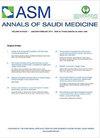Clinical outcomes of patients with COVID-19 and inflammatory rheumatic diseases receiving biological/targeted therapy
IF 1.8
4区 医学
Q2 MEDICINE, GENERAL & INTERNAL
引用次数: 1
Abstract
BACKGROUND: Anti-cytokine treatments are used in the treatment of severe COVID-19. Other studies have shown statistical significance with TNF inhibitors but not with other biological/targeted synthetic disease-modifying anti-rheumatic drugs (b/tsDMARD). OBJECTIVES: Compare the rate of severe acute respiratory syndrome coronavirus-2 (SARS-COV-2) infection and the course and incidence of COVID-19 infection in patients who received b/tsDMARD with control patients. DESIGN: Analytical cross-sectional SETTINGS: Tertiary care hospital PATIENTS AND METHODS: All patients who applied to the rheumatology outpatient clinic between June 2020-March 2021 and received b/tsDMARD were included in the study. All patients with rheumatoid arthritis, psoriatic arthritis and spondyloarthritis who applied to the rheumatology outpatient clinic in the three months before March 2021 and did not receive b/tsDMARD were included as the control group. History of COVID-19 infection and treatments were recorded. Multivariate analysis was performed to assess factors associated with use of tumor necrosis factor (TNF) inhibitors and differences between specific biologic drugs. MAIN OUTCOME MEASURES: Rate of COVID-19 disease among patients using biological/targeted synthetic therapy and non-biological/targeted synthetic therapy. COVID-19 clinical outcomes (hospitalization, intensive care admission, mechanical ventilation and death). SAMPLE SIZE: 553 in total; 341 received b/tsDMARD, 212 in the control group that did not receive b/tsDMARD. RESULTS: One hundred patients (18%) had been infected with SARS-COV-2. The difference in SARS-COV-2 infection between b/tsDMARD and the control was statistically significant (13, 2% vs. 25, 9%, respectively) (P<.001). The hospital stays were longer in the controls (P<.001). Multinomial regression analysis revealed that COVID-19 negative patients were more likely to use tumor necrosis factor (TNF) inhibitors (OR: 2, 911; 95% CI: 1.727-4.908; P<.001) compared to COVID-19 positive participants. Multinomial logistic regression analysis indicated that non-hospitalized patients were more likely to use TNF inhibitors (OR: 11, 006; 95% CI: 3.447-35.138; P<.001) and there was no significant difference between b/tsDMARDs other than TNF inhibitors in frequency of hospitalization. CONCLUSIONS: Patients who were medicated with b/tsDMARD were less likely to be infected with COVID-19 and be hospitalized due to the infection. We have found that this effect was particularly dependent on the use of TNF inhibitors. LIMITATIONS: Conducted in a single center and unable to provide a homogeneous study population. CONFLICT OF INTEREST: None.新冠肺炎和炎性风湿性疾病患者接受生物/靶向治疗的临床结果
背景:抗细胞因子治疗用于治疗严重的新冠肺炎。其他研究表明,TNF抑制剂具有统计学意义,但与其他生物/靶向合成疾病修饰抗风湿药物(b/tsDMARD)没有统计学意义。目的:比较接受b/tsDMARD的患者与对照患者的严重急性呼吸综合征冠状病毒-2(SARS-COV-2)感染率、新冠肺炎感染的病程和发病率。设计:分析横断面设置:三级护理医院患者和方法:所有在2020年6月至2021年3月期间申请风湿病门诊并接受b/tsDMARD的患者均纳入研究。所有在2021年3月之前的三个月内申请风湿病门诊且未接受b/tsDMARD治疗的类风湿性关节炎、银屑病关节炎和脊椎关节炎患者均被纳入对照组。记录新冠肺炎感染史和治疗情况。进行多因素分析以评估与肿瘤坏死因子(TNF)抑制剂的使用相关的因素以及特定生物药物之间的差异。主要观察指标:使用生物/靶向合成治疗和非生物/靶向合成治疗的新冠肺炎患者患病率。新冠肺炎临床结果(住院、重症监护入院、机械通气和死亡)。样本量:共553个;未接收b/tsDMARD的对照组中的341、212接收b/tsDMA RD。结果:100名患者(18%)感染了严重急性呼吸系统综合征冠状病毒2型。b/tsDMARD与对照组之间的SARS-COV-2感染差异具有统计学意义(分别为13%、2%和25%、9%)(P<.001)。对照组的住院时间更长(P<0.001)。多项回归分析显示,与对照组相比,新冠肺炎阴性患者更可能使用肿瘤坏死因子(TNF)抑制剂(OR:2911;95%CI:1.727-4.908;P<.001新冠肺炎阳性参与者。多项逻辑回归分析表明,非住院患者更有可能使用TNF抑制剂(OR:11006;95%CI:3.447-35.138;P<.001),除TNF抑制剂外,b/tsDMARD之间的住院频率没有显著差异。结论:服用b/tsDMARD的患者感染新冠肺炎和因感染住院的可能性较低。我们发现这种作用特别依赖于TNF抑制剂的使用。局限性:在单一中心进行,无法提供同质的研究人群。利益冲突:无。
本文章由计算机程序翻译,如有差异,请以英文原文为准。
求助全文
约1分钟内获得全文
求助全文
来源期刊

Annals of Saudi Medicine
医学-医学:内科
CiteScore
2.80
自引率
0.00%
发文量
44
审稿时长
4-8 weeks
期刊介绍:
The Annals of Saudi Medicine (ASM) is published bimonthly by King Faisal Specialist Hospital and Research Centre, Riyadh, Saudi Arabia. We publish scientific reports of clinical interest in English. All submissions are subject to peer review by the editorial board and by reviewers in appropriate specialties. The journal will consider for publication manuscripts from any part of the world, but particularly reports that would be of interest to readers in the Middle East or other parts of Asia and Africa. Please go to the Author Resource Center for additional information.
 求助内容:
求助内容: 应助结果提醒方式:
应助结果提醒方式:


